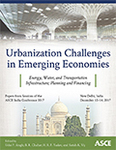ASCE India Conference 2017
Environmental Sustainability Assessment of Soil Amendments for Enhanced Phytoremediation
Publication: Urbanization Challenges in Emerging Economies: Energy and Water Infrastructure; Transportation Infrastructure; and Planning and Financing
ABSTRACT
Phytoremediation is a feasible and promising technique to treat mixed contamination in soils because of its good field-scale applicability. However, survival of the plants in highly contaminated areas is one of the most important limiting factors. The addition of organic matter to the soil buffers the negative impact of heavy metals and promotes biodegradation of organic contaminants thereby increasing the chances of survival of the plant species. In this study, an environmental impact assessment of the use of four different organic amendments namely biosolids, biochar, compost, and animal manure applied to a field-scale phytoremediation for treatment of mixed contaminated soil is performed. The environmental impacts associated with the production of each of the soil amendments alone are assessed. Thereafter, the total environmental impacts from the material production and transportation of the materials to the field site are evaluated. The results from the environmental sustainability assessment show that the use of biosolids as organic soil amendment is the most sustainable option.
Get full access to this article
View all available purchase options and get full access to this chapter.
REFERENCES
Alanya, S., Dewulf, J., & Duran, M. (2015). “Comparison of overall resource consumption of biosolids management system processes using exergetic life cycle assessment”. Environmental science & technology, 49(16), 9996-10006.
Amaya-Santos, G., and Reddy, K. R. (2017). “Phytoremediation of heavy metals and pahs in alkaline slag fill at a wet meadow site”. Journal of Hazardous, Toxic, and Radioactive Waste, 21(4), 04017014.
Bergman, R. D., Gu, H., Page-Dumroese, D. S., & Anderson, N. M. (2016). “Life cycle analysis of biochar”. Biochar, 46.
Cameselle, C., Chirakkara, R. A., & Reddy, K. R. (2013). “Electrokinetic-enhanced phytoremediation of soils: status and opportunities”. Chemosphere, 93(4), 626-636.
Chirakkara, R. and Reddy, K. (2015) “Phytoremediation of mixed contaminated soils: enhancement with biochar and compost amendments”. IFCEE 2015pp. 2687-2696.
Goldenberg, M., and Reddy, K. R. (2014). “Sustainability assessment of excavation and disposal versus in situ stabilization of heavy metal-contaminated soil at a superfund site in Illinois”. Geo-Congress 2014 Technical Papers: Geo-Characterization and Modeling for Sustainability.pp. 2245-2254.
Reddy, K. R., Sadasivam, B. Y., & Adams, J. A. (2014). “Social sustainability evaluation matrix (SSEM) to quantify social aspects of sustainable remediation”. In ICSI 2014: Creating Infrastructure for a Sustainable World (pp. 831-841).
Reddy, K. R., & Amaya-Santos, G. (2017). “Effects of variable site conditions on phytoremediation of mixed contaminants: field-scale investigation at big marsh site”. Journal of Environmental Engineering, 143(9), 04017057.
Reddy, K. R., Amaya-Santos, G., Yargicoglu, E., Cooper, D. E., & Negri, M. C. (2017a). “Phytoremediation of heavy metals and PAHs at slag fill site: three-year field-scale investigation”. International Journal of Geotechnical Engineering, 1-16.
Reddy, K. R., Amaya-Santos, G., & Cooper, D. E. (2017b). “Field-scale phytoremediation of mixed contaminants in upland area of big marsh site, Chicago, USA”. Indian Geotechnical Journal, 1-16.
Sellaperumal, P. (2011). “Evaluation of thermochemical decomposition of various lignocellulosic biomasses for biochar production”. Master of Science Thesis, McGill University, Ste Anne De Bellevue, Quebec, Canada.
U.S. EPA. (United States Environmental Protection Agency). (2009). “Sustainable technology systems analysis, TRACI - Tool for Reduction and Assessment of Other Environmental Impacts”. Ohio, USA: Environmental Protection Agency.
Information & Authors
Information
Published In
Urbanization Challenges in Emerging Economies: Energy and Water Infrastructure; Transportation Infrastructure; and Planning and Financing
Pages: 130 - 136
Editors: Udai P. Singh, B. R. Chahar, Indian Institute of Technology, H. R. P. Yadav, Institution of Engineers (India), and Satish K. Vij
ISBN (Online): 978-0-7844-8202-5
Copyright
© 2018 American Society of Civil Engineers.
History
Published online: Dec 13, 2018
Published in print: Dec 13, 2018
Authors
Metrics & Citations
Metrics
Citations
Download citation
If you have the appropriate software installed, you can download article citation data to the citation manager of your choice. Simply select your manager software from the list below and click Download.
